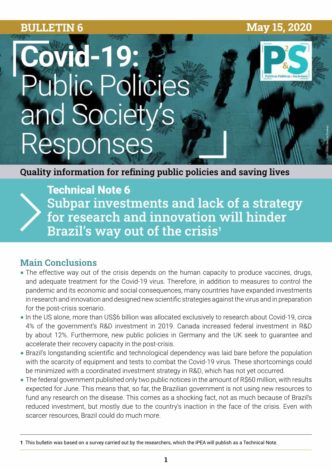Main Conclusions
- The effective way out of the crisis depends on the human capacity to produce vaccines, drugs, and adequate treatment for the Covid-19 virus. Therefore, in addition to measures to control the pandemic and its economic and social consequences, many countries have expanded investments in research and innovation and designed new scientific strategies against the virus and in preparation for the post-crisis scenario.
- In the US alone, more than US$6 billion was allocated exclusively to research about Covid-19, circa 4% of the government’s R&D investment in 2019. Canada increased federal investment in R&D by about 12%. Furthermore, new public policies in Germany and the UK seek to guarantee and accelerate their recovery capacity in the post-crisis.
- Brazil’s longstanding scientific and technological dependency was laid bare before the population with the scarcity of equipment and tests to combat the Covid-19 virus. These shortcomings could be minimized with a coordinated investment strategy in R&D, which has not yet occurred.
- The federal government published only two public notices in the amount of R$60 million, with results expected for June. This means that, so far, the Brazilian government is not using new resources to fund any research on the disease. This comes as a shocking fact, not as much because of Brazil’s reduced investment, but mostly due to the country’s inaction in the face of the crisis. Even with scarcer resources, Brazil could do much more.
- This stance by the federal government condemns Brazil to be no more than a consumer of S&T. As in other smaller pandemics, the lack of strategies for the development of vaccines and other drugs will leave the country at risk of being completely devoid of any vaccines or medical equipment and supplies, which will be conveyed to supply countries with better scientific competence and greater purchasing power.
Work group responsible
Coordination: Fernanda De Negri and Priscila Koeller (IPEA/Centro de Pesquisa em Ciência, Tecnologia e Sociedade)
Researchers:
- Graziela Zucoloto (IPEA)
- Pedro Miranda (IPEA)


